Artifacts - Documents - Medals and Insignia - Maps - Coins and Currency
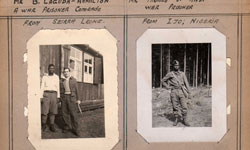 |
|
| From a diary kept by West African prisoners of war in a German prison camp, WWII. Mr. B. Laguda-Hamilton was one of the P.O.W.'s. | |
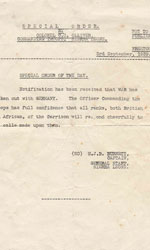 Original announcement to British troops and the Sierra Leone Regiment of the West African Frontier Force of Declaration of War against Germany, 1939. Original announcement to British troops and the Sierra Leone Regiment of the West African Frontier Force of Declaration of War against Germany, 1939. |
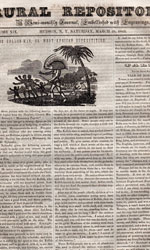 1843 issue of "Rural Repository", a Hudson, NY newspaper, USA, with an article about "The Kolloh-Man, or West African Tradition". The Kolloh-Man was supposed to be a Sherbro devil who kept bad children in line. This may have been mythological creature made up by early American missionaries to scare their congregations. 1843 issue of "Rural Repository", a Hudson, NY newspaper, USA, with an article about "The Kolloh-Man, or West African Tradition". The Kolloh-Man was supposed to be a Sherbro devil who kept bad children in line. This may have been mythological creature made up by early American missionaries to scare their congregations. |
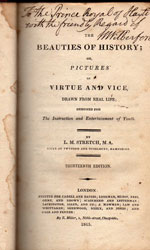 Early 19th century book inscribed to the Prince Royal of Hayti with friendly regard by the famous abolitionist, William Wilberforce. Early 19th century book inscribed to the Prince Royal of Hayti with friendly regard by the famous abolitionist, William Wilberforce. |
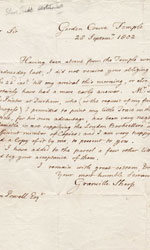 Original 1803 autograph letter signed by the famous English slave trade abolitionist, Granville Sharp. Original 1803 autograph letter signed by the famous English slave trade abolitionist, Granville Sharp. |
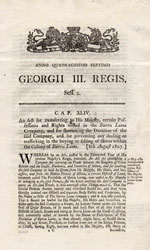 Proclamation from King George III, issued in 1807, prohibiting dealing in slaves in the Colony of Sierra Leone and providing for the dissolution of the Sierra Leone Company. Printed in London, 1807. [PDF] Proclamation from King George III, issued in 1807, prohibiting dealing in slaves in the Colony of Sierra Leone and providing for the dissolution of the Sierra Leone Company. Printed in London, 1807. [PDF] |
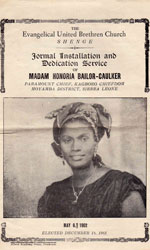 Program for the Formal Installation and Dedication Service of Madam Honoria Bailor-Caulker as Paramount Chief, Kagboro Chiefdom, Moyamba District, Shenge, 6 May 1962. Program for the Formal Installation and Dedication Service of Madam Honoria Bailor-Caulker as Paramount Chief, Kagboro Chiefdom, Moyamba District, Shenge, 6 May 1962. |
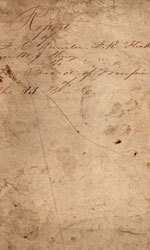 Cover page of original 1853 handwritten report of the UBC missionaries, W.J. Shuey, D.C. Kumler and D.K. Flickinger, to the leadership of their church on their lengthy trip around Sierra Leone looking for locations where mission outposts could be established. Cover page of original 1853 handwritten report of the UBC missionaries, W.J. Shuey, D.C. Kumler and D.K. Flickinger, to the leadership of their church on their lengthy trip around Sierra Leone looking for locations where mission outposts could be established. |
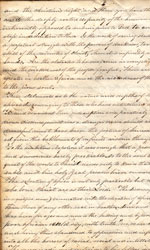
A sample page from the 42-page UBC missionary document (at left). Click the link for the full text in PDF format. The report is 42 pages in length and contains detailed information about chiefs, secret societies, and local traditions. |
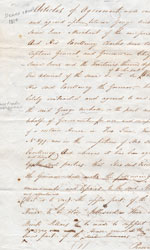
Front Page Original 1812 contract between Governor Charles McCarthy of Sierra Leone and George Nicholl, a notorious Freetown slave trader, concerning payment arrangements and architectural details for building the Governor's House. |
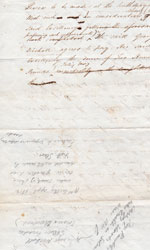
Back Page McCarthy was a colleague of William Wilberforce, and founded settlements for liberated slaves in Freetown. He was later beheaded during the Ashanti War in 1824 while he was Governor of the Gold Coast. |
